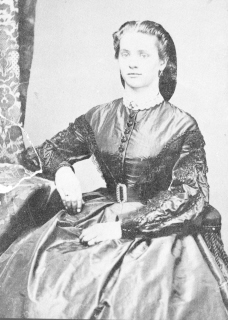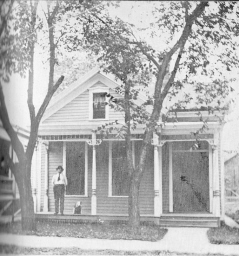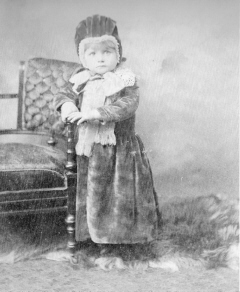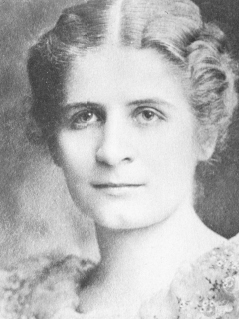


I was born in a great hurry one bright Sunday morning in June, '87, in St. Paul, Minnesota, arriving so precipitously that there was not even time to send for the midwife who usually presided on these occasions in modest households such as ours. Being born on Sunday is said to be lucky!
Both my father and mother had originally come from [the Czech Republic], which in those days was called Bohemia. Mother was eight when her family brought their thirteen children to America and settled in Chicago, where there was a large Czech colony... As soon as they were settled, mother entered public school. Learning English is never easy for a Czech, and when (after she had been struggling with the language for four years) some classmates shouted Bohunk at her once too often, the proud, sensitive little girl closed her books, walked home, and announced that she was never going back, she was going to work.
There were no child-labor laws at that time, and the four or five dollars she would earn would help the family in their struggle to survive in this strange new country, so apparently no effort was made to stop her. She found a job in a fur shop.
Though I was an adolescent and already imbued with a great passion for words, I was troubled by my mother's lack of education in English. She would accept my efforts to correct her with gentle grace, but she never did master this verbal devil, English.
Yet, she was well-read in her own culture. Bohemia was then part of the Austro-Hungarian Empire, and mother knew both German and Czech. She had read Schiller and Goethe in the original and was familiar with most of the best Czech authors...
My father was also a Bohemian. In their own tongue the area was called Czechic, and the natives were known as Czechs. The son of a baker. he was born in Kralovitse, near Pilsen. Since families with limited means could not afford higher education for all their children, the most promising would be selected to go on with more advanced education. Father was selected for this privilege and was enrolled at the Polytechnic Institute from which he was graduated as a surveyor. For several years he worked as an assistant to a government inspector. Then, eager to escape the politically troubled atmosphere prevailing in this region of the Hapsburg Empire, he emigrated to the United States. He was an attractive, prematurely gray, young man of twenty-eight when he joined the Czech colony in Chicago.
It was not easy for a newcomer to find a job, but since father had a natural gift for writing, he soon obtained a post on a Czech newspaper. After a few years of struggle, he heard of an opening for a Czech teacher in the Jefferson School, a grade school in St. Paul, Minnesota. Among his papers we found the following account of his beginnings in St. Paul:
“The St. Paul Board of Education decided to employ at Jefferson School, a Czech teacher to instruct the increasing number of Czech children recently arrived from Bohemia. A class of twenty was formed. Vaclav Jelinek, a St. Paul tailor. was appointed to teach them. After four weeks of teaching, Jelinek evidently decided that tailoring was more remunerative. He resigned. But he used his influence for me .... I was appointed in his place. The salary was $450.00 for nine months.”
It is a matter of record in the history of education in Minnesota that my father's teaching methods were unique for that day. One of his innovations stemmed from the fact that he was a musician of some ability. He began and ended all of his classroom sessions with music. He would write the words to Czech and English songs on the blackboard. The older pupils would copy the words, then sing them back in English for the benefit of the younger boys and girls. Next, father would play the tunes of unfamiliar songs on his violin; the youngsters would quickly pick up the tunes and would soon be singing the English words that went with the music. They learned by imitation and repetition.
Father was also a great believer in physical exercise, My older sister, Rose, used to tell how, whenever his charges seemed restless, father would stop all other work in the class for a few moments of setting-up exercises. The school principal would take visitors to inspect his "model primary room," known for its gymnastics, singing, good discipline, and harmonious spirit.
Father had genuine affection for his pupils. [He still is] able to mention a surprising number of them by name. He also gave Saturday, his one free day in the week, to the teaching of the Czech language to second-generation Bohemian children who were all too rapidly forgetting the language of their parents. As children we found his insistence that Czech he spoken in our home a nuisance. I can remember sitting in sulky silence through many a meal, for it was then that the rule "Czech only" was most strictly enforced. However, we continued to call our parents Tatinek and Maminka throughout their lifetime, and as I grew older the affectionate flavor of these words always gave me pleasure. I also came to understand the immigrant Czechs' deep love for their native language.
My father was vitally interested in the theatre. He once told me that as a young man in Bohemia he had wanted to go on the stage. To his family this seemed so frivolous an ambition that he soon gave it up. However, amateur acting continued to be his chief hobby, and during his early years in Chicago he devoted most of his spare time to staging and acting in plays produced by members of the Czech colony there. He occasionally appeared in Czech plays produced by dramatic organizations in other cities, and he spent many of his holidays performing as guest star in response to such invitations.
After their arrival in America, my mother's family had taken root in Chicago. My grandfather had established his own little hardware store, and almost all of the children had managed to get jobs of some sort with miniscule pay which, nevertheless, contributed to the family bank account.
The social life of the Czech community revolved around the local Sokol--an affiliate of an international Czech organization whose major purpose was to cultivate physical fitness among its members through a series of gymnastic disciplines. But Sokol activities also included cultural programs of music, dancing, and amateur theatricals.
My parents first met at various social affairs at the Sokolovna (the clubhouse) before my father went to St. Paul to teach. He had been immediately attracted to the tall, beautiful girl with her apple-blossom skin and luxuriant hair. But as a struggling journalist on the Czech paper he was in no position to marry. Several years were to elapse before he returned to Chicago from St. Paul to propose to her. (In the years between, my mother had suffered a great deal of unhappiness, but it was to be many years before we, their children, were to learn that story.) They were married quietly, and father brought his bride to the cottage where all their children were born. [Photo, Info]



[Looking back, I wonder] where mother had found space to put us all. I had found my spot on the roof of a red woodshed in the back yard shaded by an overhanging apple tree. An inveterate reader, I found that by lying flat on my stomach, I could remain concealed, safely ignoring any voice calling me from below.
I was never conscious of being poor. We children never knew hunger as do millions of children in the world.. To be sure, I never had a new dress, made for me, until I was twelve years old. The daughter of our rich uncle in Chicago was just my size, so her clothes were passed on to me. But they were beautiful clothes, made of fine materials, and I grew up feeling well-dressed.
Father, an artist at heart, was a man of considerable temperament, which expressed itself frequently in unreasonable outbursts over what seemed to us trifles. He had an old-world concept of what a man's authority in his home should be. There was something magnificent about Father in a rage. Unintentionally, I would undermine these performances when I was a little girl [Photo] by looking up at him and chortling with glee, whereupon his rage would gradually subside.
Mother was endlessly patient with him, but his insistence on parental authority deprived him of close companionship with all of his children except for Rose, his favorite. He was forty-seven when I was born, and in his later years…his authoritarianism had begun to yield under the pressure of the new individualism already emerging in my generation.
My sister Rose was quiet and overly shy. She was rather tall for her age, and this, combined with, the fact that family finances were at their worst during her high school years, made her social adjustment still more difficult. It was a long time before she overcame the inhibitions engendered by those early circumstances. [In New York she attended Teacher’s College, and soon got a job teaching elementary school at P.S. 6, not far away at 81st St. and Madison Avenue.]
 Mila, the eldest, lived with our grandmother in Chicago. She was old enough to earn her living as a dressmaker. I saw very little of her during my early years in St.Paul. Only for a few weeks during the summer would she come home to visit us, bringing into the household such interesting clothes, perfumes and beaux that she appeared to me as a distinctly glamorous figure.
Mila, the eldest, lived with our grandmother in Chicago. She was old enough to earn her living as a dressmaker. I saw very little of her during my early years in St.Paul. Only for a few weeks during the summer would she come home to visit us, bringing into the household such interesting clothes, perfumes and beaux that she appeared to me as a distinctly glamorous figure.
Charlie, my older brother, was a chunky, thickset youngster, very pugnacious. His lack of height bothered Maminka. "My daughters are growing so tall," she would wail, "but my boys stay so short. It should be the other way around." But between fifteen and seventeen, Charlie suddenly shot up to his full height and towered over all of us.
During our childhood, I was the little sister whom he alternately protected and bullied. One supper time I was hanging over the back fence, talking to my favorite school chum. Charlie, sent to fetch me, delivered his message. I paid no attention. Again he said, "Mother wants you to come for supper." Loftily, I continued to ignore him. Suddenly I was seized by my thick, yellow pigtail, dragged across the yard screaming and kicking, and deposited on the doorstep. "There," he said, panting, "I guess that will teach you to come home when I tell you." My furious complaints were soothed by Mother. "It is good for your hair to be pulled," she laughed. "It will make it grow thick and long."
Little brother Tony had none of Charlie's truculence. I remember the night he was born, although I was very young indeed. Our little cottage was overflowing with busy neighbors running in and out of Mother's bedroom. Rose and I were shunted out of the way. Finally I was allowed to go in and peek at a little bundle of blankets from the midst of which peeked a pair of enormous, deep blue eyes. Tony emerged from babyhood an affectionate, sensitive child, tagging along with the rest of us, doing his best to keep np with our games.
As for me, I had to be in everything, from the baseball team to performances of "Living Statues," for which admission was paid in pins. But most of all I loved reading. Words had a fascination for me which they have never lost, and I bandied them about with careless ease. On one occasion, I overreached myself. One of Mila's beaux was waiting for her in the parlor. Supper over, I hurried as usual to the piano to practice, having learned that I could thus get out of wiping the dishes. I was giving a nine-year-old's earnest interpretation of McDowell's "To a Water Lily," when Bob, the beau, said politely, "You play very nicely, Blanche." During a pause, as I turned a page, I replied loftily, "Yes, Robert, I find music a most excellent laxative."
Our life in St. Paul came to an end because of a reorganization of the curriculum at Jefferson School which resulted in the dropping of father's classes. He heard that a Czech Benevolent Society in New York was looking for an executive secretary. It was one of the organizations which provide death benefits for its members, as well as social advantages. Desperately needing work, for there were no teachers' pensions in those days, father overcame his deep reluctance to leave St. Paul and his beloved Czech activities and cronies and went East the following autumn to try the secretaryship for a year. In the meantime, the family remained in St. Paul.
During that year I sensed that Mother had many qualms about the projected move to the big city. She seemed worried and frightened; more than once I saw tears in her eyes. All the family had qualms--except for me. I was too young to realize what was going on. I found a dozen reasons to see this new venture as a good move for all of us. Charlie, the chronic debunker, shrewdly put his finger on my chief reason. One night when I was being particularly persuasive, he said, "Aw, we all know why you want to go to New York. It's because all those theatres are there:' Of course I denied it vehemently. But it was the truth--a truth which was to mold my entire life.
Source: Yurka, Blanche, Bohemian Girl: The Theatrical Life of Blanche Yurka, Chapter 1. (Athens, Ohio: Ohio University Press, 1970)